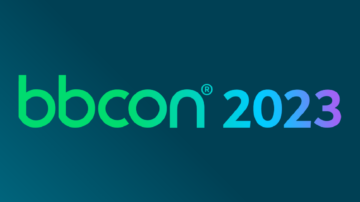5 Takeaways from the bbcon 2020 Virtual Higher Ed Super Session

We successfully hosted our first fully virtual and truly global conference, bbcon 2020. We had a record-breaking 38,000+ registrants from 70 countries and higher ed was the largest group in attendance. We welcomed over 6,000 professionals representing departments across campus, including advancement, marketing, financial aid, academic leadership and more, from private and public 2-year and 4-year institutions
For this year’s Higher Ed Super Session, I was joined by Cara Giacomini, Chief Research and Data Officer at Council for Advancement and Support of Education (CASE), James Wiley, Principal Analyst at Eduventures, and Jamie Harper, Vice President of US Education at Microsoft. 2020 has been a year like no other and so was our Super Session. In a time of unexpected and continued change, we discussed new trends from 2020 and how Blackbaud customers and the industry are responding to today’s environment and developing new strategies for success.
If you couldn’t attend, you can still use the below themes to inspire meaningful conversations as we all continue to learn how to navigate today’s shifting landscape.
Higher Education Resiliency
During the COVID-19 pandemic, we’ve seen the resiliency and creativity of the higher education industry shine through. A few great examples include:
- When international students had to return to their home countries, many institutions matched international alumni living abroad with these students back in their home country. They were able to meet via phone and social media channels, as well as in person while remaining socially distance.
- Institutions got creative sources of higher ed talent to boost alumni engagement. Some of these activities included virtual Wine and Art Nights with art professors, yoga sessions with exercise science professors, and music nights or lessons with music professors.
- To provide financial support for students impacted, institutions rallied donors and alumni to raise funds for travel, food, and other expenses to help keep them safe in the dorm if their home or living situation did not support them going home.
- To aid COVID-19 vaccine research, institutions bypassed guidelines or proprietary processes for sharing research to best support the collaborative efforts to produce a vaccine.
Emerging Tech Trends
COVID-19 pressure has tested existing EdTech needs and processes, especially in the areas of support for online students. As a result, majority of the focus has been on technology that enables course delivery, assessment, online learning, and academic support. That said, as institutions shift their focus to provide an exceptional remote learning environment, student engagement and advising have been getting more attention.
Institutions are no longer viewing the student journey as they traditionally have in the past. A new focus has emerged, and more are taking additional measures to ensure students feel engaged and a sense of belonging as they progress through their higher education journey. This approach also requires institutions to begin thinking about how it all fits together. This “tying together” is causing them to consider access (identity management) and integration with other solutions across campus. For example, by bringing together its formerly disparate advancement, award management, and fund accounting units together in the cloud, the University of South Carolina is realizing not only data synchronization and enhanced visibility, but a system-wide realignment that had not previously been possible.
When selecting new technology, the pandemic has caused institutions to think more about end-user satisfaction and overall satisfaction, all of which involve considerations of usability, reliability, etc. During the decision-making process, a clear adoption model should be involved as well as an understanding of alignment of technology with goals and how technology fits within the overall ecosystem.
Changes in Fundraising Appeals
CASE conducted a short survey that went out to a global audience and had 450 responses, an exploration of Innovations in Alumni Relations. Advancement professionals were surveyed about changes they had made to fundraising and events in response to COVID-19.
Among institutions that did adjust their approach to appeals, the most common changes reported were decreasing the frequency of direct mail/email appeals and cancelling or deferring phonathon campaigns. Twelve percent canceled online giving days—although others reported keeping but changing the focus of giving days to focus more on student emergency aid. For example, Bradley University raised over $400K from more than 451 donors during its #BravesTakeCare annual day of giving campaign to help students with immediate needs.
Interestingly, a minority of respondents (11%) reported increasing rather than decreasing their appeals—often with the inclusion of fundraising for new initiatives. Using its fundraising software, Winthrop University followed its #GivingTuesdayNow campaign with a remote thank-a-thon and raised over $30,000 to support students in need during its campus closure.
Staying Agile
From the initial closures to waves of decisions about what to do for fall semester and now with openings and subsequent closings, for all our communications colleagues, it has been all-crisis, all the time. While those teams have been under stress, they have responded with resilience, creativity, and commitment. We have also seen agility shown in engagement with key stakeholders—including the ability to convene advisory groups with good reason to connect during COVID-19.
Engaging Philanthropic Communities
We have also seen tremendous commitments to giving. Advancement leaders have engaged their philanthropic communities – some institutions have even seen increased giving since the pandemic. Many if not most institutions launched COVID-19–related fundraising efforts for students, staff, and their immediate communities. Indiana University of Pennsylvania (IUP) immediately moved to establish an online emergency response fund for students, faculty and staff impacted by COVID-19. By May, IUP raised over $193K from more than 383 donors in support of the Emergency Response Fund and Food Pantry.
While we would have all preferred to convene in person, bbcon 2020 Virtual still provided attendees with thought-provoking content and an interactive and engaging experience.
Couldn’t attend live? Visit www.bbconference.com and register by November 11 to access over 100 sessions on demand. Explore additional resources around these topics on the Blackbaud Higher Education content hub.


